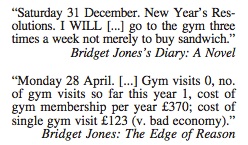
Weekly Roundup: 6 Mysteries
January 17, 2015
Why Are We Still Short on Female CEOs?
January 19, 2015
During 2013, 52.9 million people–many who rarely exercised–spent almost $23 billion at health and fitness clubs in the U.S.
Where are we going? To how behavioral economics explains why we spend a lot not to work out.
The Attraction
Planet Fitness, a national health club chain, gives away three million slices of pizza each year. The pizza is a membership perk. Monthly, Planet Fitness has a free pizza night and a bagel breakfast. According to the chain’s founder, his competition targets the people who want to work out regularly. His market is the people who do not.
Planet Fitness is a budget chain with membership as low as $10 a month. The low price is the incentive to join and remain. Estimated by one employee, membership at her Upper West Side NYC location is close to 6,000 but the equipment can accommodate no more than 300 people. Because members seem to prefer the bagel breakfasts, the cardio and weight equipment do not matter.
Even for the pricer establishments like Equinox, the focus is “wellness offerings” that, at one NJ location, begins with “a landscaped green wall, cobblestone drive and a grand barrel vault wood ceiling…” According to a health club architect, the design is supposed to resemble a bar when you enter. Taking one reporter on a tour, he explained that he hides the serious workout equipment in a separate room downstairs.
The Cost
Health club payment plans tend toward three basic options. You can pay per visit, per month or per year. An initiation or joining fee is also typical. While social media indicate membership charges can be negotiable, Equinox says that it charges a $200 initiation fee that it would refund for 12 work-outs in 30 days and a monthly charge in the vicinity of $80 to $100.
So, combine a pleasant workout environment, a place to gather with friends and an affordable upfront price and you get a deal most people cannot refuse.
But why?
Our Bottom Line: Behavioral Economics
Our health club membership behavior has a bigger message:
We inaccurately perceive our future selves. Whether under saving for retirement or over planning our visits to the gym, we let our current outlook cloud a potential future reality. Some behavioral economists call this a projection bias.
Pre-commitment is attractive. it makes many of us feel virtuous, we think our peers will admire us, and it locks us in to our virtuous decision.
Paying upfront, monthly or annually, diminishes the transaction costs. Continuing is the default decision. To cancel, we have to do more.
![econlifelogotrademarkedwebsitelogo[1]](/wp-content/uploads/2024/05/econlifelogotrademarkedwebsitelogo1.png#100878)



